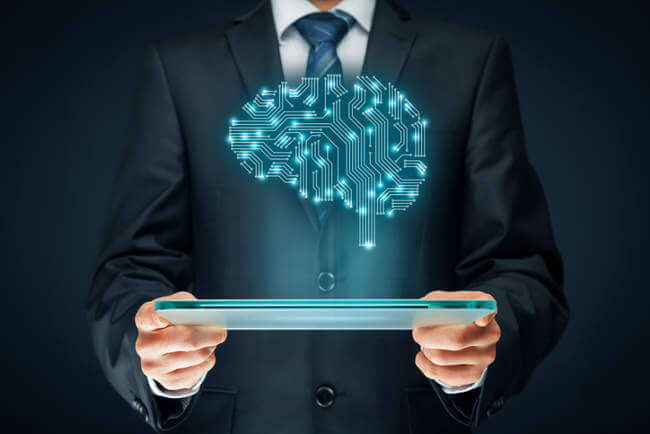As it grows in popularity, more and more clients have asked “What is artificial intelligence?” It sounds like something found only in science fiction movies, but it’s quickly becoming more commonplace in both personal and business life.
What is Artificial Intelligence?
Artificial intelligence (AI) is the theory and development of computer systems that are able to perform tasks that normally require human intellect, like visual perception, speech recognition and decision-making.
When people ask “What is artificial intelligence?” they often don’t realize that they likely use it on a daily basis. Cortana, Netflix’s recommended viewing lists and those chatbots that talk to you on retailers’ websites are examples.
How can it be used in Business?
Before we get into specific uses of artificial intelligence for business, it’s important to note that AI should be used to augment, not replace, your workforce. Technology can fully replace very few jobs, but it can make almost every job much easier.
1. Virtual Assistants
Virtual assistants like Cortana and Google Assistant are useful for much more than giving driving directions and hands-free texting.
For example, Cortana can integrate with Office 365. This simplifies plenty of tedious administrative tasks, such as scheduling meetings and typing up notes. Also, since most virtual assistants pick up on your habits, they become more intuitive and helpful the more you use them.
Customer service is made easier with AI, too. Many websites now make use of chatbots to greet users as they visit, asking if they need help. If they respond, a human sales rep is alerted and can then assist them further.

2. Data Insights
Modern AI algorithms are powerful and reliable enough to not only record data, but identify patterns within it.
AI analysis can provide you with valuable data insights, which will then help inform your business’ marketing strategy, sales tactics, product development plan and much more.
3. Cybersecurity
Cybercriminals are getting better and better at keeping a low profile after they’ve breached a network. Security software is having a tough time keeping up as a result. In fact, the average data breach goes unnoticed by the victim for a staggering three months.
Top security firms are using artificial intelligence to detect anomalies within networks, identifying threats and breaches. However, hackers can also use artificial intelligence to their advantage by creating more sophisticated malware.
The result is a sort of cybersecurity chess game, with each side trying to stay a few moves ahead of the other. While the result is unpredictable, one thing is for certain: artificial intelligence will play an increasingly large role in the future of cybersecurity.

4. Tone Assessment
In business, the tone of your written voice is incredibly important, whether in an email, press release or a brief Facebook post. Being interpreted incorrectly can be awkward at best and lead to lost revenue at worst.
IBM’s Watson, a severely-underrated AI program, is capable of analyzing the tone of a written message. It takes into account language, emotional and social tones to ensure your writing will resonate with its intended audience.
We hope that this blog thoroughly answers the question, “What is artificial intelligence?” And remember, AI will not entirely automate your business’ workforce, but it will augment it!
{{cta(‘732372f9-1981-481c-88af-248a1b9c79b2’)}}





